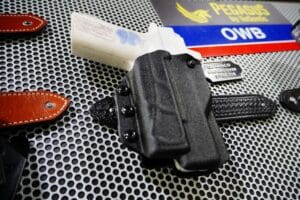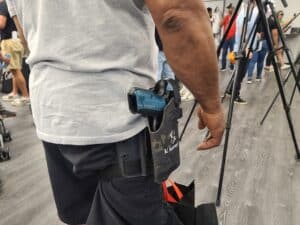One of Pennsylvania’s top courts has tossed out charges against a 20-year-old man for openly carrying a gun in Philadelphia without a permit.
On Monday, the state Superior Court ruled 2-1 that a state law requiring a permit to carry in the city was unconstitutional as applied to the defendant. It determined the law treated the rights of those inside Philadelphia differently from those inside the city. The Court decided it ultimately violated the federal and state constitutions.
“Since we are dealing with a fundamental right, the different treatment accorded to persons within Philadelphia under § 6108 does not pass constitutional muster,” Judge Victor P. Stabile wrote for the majority in Pennsylvania v. Sumpter.
The ruling offers 20-year-old Riyaadh Sumpter a reprieve from prosecution. It also means that it will be more difficult to bring charges against people openly carrying firearms in Philadelphia without a permit. That’s especially true for those aged 18–20 since, as the Court pointed out, they can’t legally obtain a license to carry due to their age.
Sumpter was open carrying a handgun on a street in Philadelphia, the only city where the state requires a license to open carry, when he was stopped by police. Sumpter did not have a license to carry the firearm and could not obtain one because applicants must be 21 years old to apply for a carry permit in Pennsylvania. He was arrested and convicted before appealing the case up to the Superior Court.
Open carrying, where somebody carries a firearm in public that is visible to others, is lawful without a permit in most states. Pennsylvania has long allowed permitless open carry, but in 1972, it passed a state law that mandated those wanting to open carry in its largest city had to get a concealed weapons permit first.
However, the United States Supreme Court’s 2010 McDonald v. Chicago decision ruled that the 14th Amendment’s Due Process Clause holds the state legislatures to respect the Second Amendment.
The Pennsylvania Attorney General’s office argued the law functions as a tool to prevent crime in Philadelphia. The Superior Court said that wasn’t proper justification for the law. It said that the fundamental right to self-defense cannot be overridden in this case by the desire to combat crime.
“The Commonwealth’s argument, along with the holding in Scarborough, rests on the untenable assumption, untenable…, that the right here involved is not fundamental,” Judge Stable, a Republican, wrote. “Precedents foreclose any argument that the Commonwealth’s stated interest—providing law enforcement with additional tools to combat crime—is sufficiently compelling to support an impingement of the fundamental right to right to keep and bear arms in the city of Philadelphia.”
The Court also rejected Pennsylvania’s argument that historic laws show that Philadelphia’s licensing requirements are constitutional. Pennsylvania cited a 1721 law that forbade “firing a gun in the city of Philadelphia without a special license from the governor.”
The Court found that the law is not analogous to the licensing requirement because of the differences between the actions under dispute.
“Put simply, carrying a gun in public in Philadelphia and shooting a gun in public in Philadelphia are two very distinct actions,” Judge Stable wrote.
The Court said the law is discriminatory against 18 to 20-year-olds, since the state requires citizens to be 21 to obtain a carry permit.
“Open carry without a license is lawful for those 18 years of age and older elsewhere in the Commonwealth but criminal in Philadelphia,” Judge Stable wrote. “Thus, § 6108 places persons within the City of Philadelphia at a special disadvantage in the exercise of their Second Amendment right.”
The majority ultimately concluded the law violated Sumpter’s rights in particular.
“In light of the foregoing, we conclude that § 6108 is unconstitutional on an equal protection basis as applied to the Appellant,” Judge Stable wrote. “The right to keep and bear arms outside the home is a fundamental right protected by the Second Amendment.”
However, it also implied the law may be unconditional as applied to anybody.
“Section 6108 requires persons who wish to openly carry a firearm on public streets and public property in Philadelphia to obtain a carry license,” Judge Staple wrote. “Open carry without a license is lawful for those 18 years of age and older elsewhere in the Commonwealth but criminal in Philadelphia. Thus, § 6108 places persons within the City of Philadelphia at a special disadvantage in the exercise of their Second Amendment right.”
Gun Owners of America applauded the decision for expanding Pennsylvanians’ gun rights.
“The court rightly recognized that the state’s open carry ban in Philadelphia violated the Equal Protection Clause of the 14th Amendment by creating a two-tiered system where the fundamental right to bear arms depends on your zip code,” Val Finnell, Pennsylvania Director for Gun Owners of America (GOA), said in a statement.
GOA also urged state lawmakers to repeal the law entirely. The state Supreme Court is the only remaining avenue for appeal in the case.
UPDATE 6-26-2025 8:30 AM EASTERN: This piece has been corrected to show the decision on the case is from the state Superior Court, not the state Supreme Court.







Only Members can view comments. Become a member today to join the conversation.